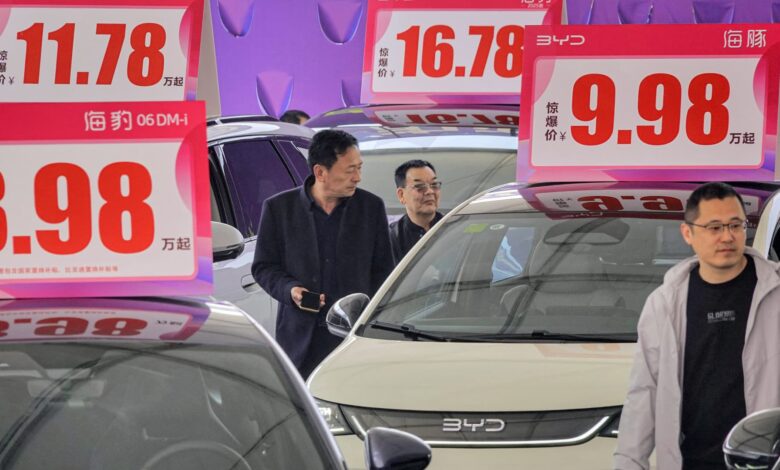China’s EV price war is heating up. What’s behind the big discounts?

The electric car market in China is heating up as industry giant BYD recently announced significant discounts on several of its lower-end battery-only and hybrid models. This move has sent shockwaves through the industry, with other major Chinese automakers following suit to stay competitive.
BYD’s decision to slash prices by nearly 30% on some models has raised concerns among smaller automakers about their ability to keep up. This price war comes at a time when China’s economy is facing slower growth and lackluster consumer demand, making the electric car market a rare bright spot.
The Chinese government has been trying to boost consumption by offering subsidies for new energy vehicles, which include battery-only and hybrid-powered cars. However, the latest round of price cuts by BYD and other automakers highlights the ongoing supply-demand imbalance in the market, leading to deflationary pressures.
The competition in China’s electric car market has been intensifying over the past two years, driven in part by the presence of Tesla. Traditional automakers, including state-owned ones, are now feeling the heat as new energy vehicles account for about half of new passenger cars sold in China.
Great Wall Motors Chairman Wei Jianjun recently warned of a potential crisis in China’s auto industry, likening the fast-growing EV sector to the country’s troubled real estate market. This comparison to the collapse of real estate giant Evergrande, which defaulted on its debt in 2021, has raised concerns about the financial stability of Chinese automakers.
Despite the price war and intense competition, BYD remains a dominant player in the Chinese electric car market. The company, which was once backed by Warren Buffett, has reported strong profits and market share gains. However, the industry is facing challenges as automakers struggle to balance price cuts with profitability.
Looking ahead, analysts expect the price war to continue as automakers vie for market share in China. Companies may also focus on offering additional features, such as advanced driver-assist systems, to attract customers. This strategy could help differentiate brands in a crowded market and drive sales growth in the coming years. BYD, a leading Chinese automaker, made headlines a month ago when it announced the rollout of driver-assist capabilities to over 20 of its car models. This move was part of the company’s ongoing efforts to enhance the safety and technology features of its vehicles.
In recent months, China’s government has been emphasizing the need to combat non-productive business competition, referred to as “involution.” This term has been highlighted in various official statements, including the premier’s annual work report and discussions by the market regulator. The goal is to address inefficiencies and promote healthy competition in the business sector.
The push for more affordable electric cars in China has raised concerns about its potential impact on global auto industries. The expansion of Chinese automakers into international markets has led to trade tensions, with the European Union and the United States imposing tariffs on China-made electric vehicles. These trade measures were in response to allegations of unfair government subsidies benefiting Chinese automakers.
Despite facing tariffs, Chinese automakers like BYD have managed to make significant strides in international markets. In a surprising turn of events, BYD outsold Tesla in Europe for the first time in April, according to data from JATO Dynamics. This achievement underscores the growing competitiveness of Chinese electric vehicles in the global market.
While tariffs have had some impact, the success of Chinese automakers like BYD in key markets demonstrates their ability to adapt and thrive in challenging environments. As the electric vehicle industry continues to evolve, it will be interesting to see how Chinese automakers navigate these complex dynamics and maintain their competitive edge on the global stage.
Overall, BYD’s recent announcement regarding driver-assist capabilities reflects the company’s commitment to innovation and technological advancement in the automotive sector. With a focus on safety and efficiency, BYD is poised to continue making waves in the industry and setting new standards for electric vehicles.





